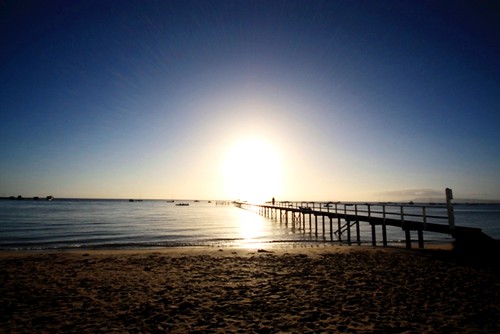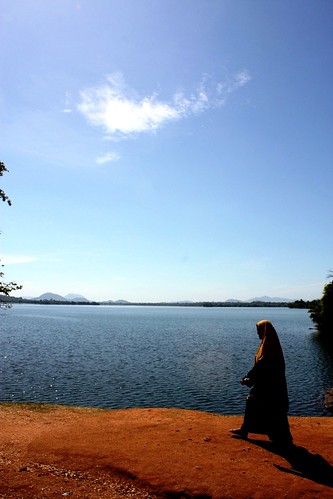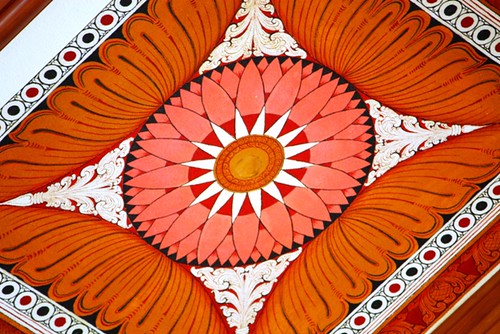Good Friday Reflection at St John's Anglican Church, Finch Street, Malvern East.
I thank you all and especially Fr. Sathi - very deeply and humbly - for inviting me to join you in your Good Friday reflection and prayer and feel truly grateful for the opportunity to share my faith with you. I suspect that the reason Fr. Sathi invited me today may have more to do with what I have written in the past than my oratory skills, and often I must write to gather my thoughts. So forgive me for reading to you rather than speaking to you. I feel I must first introduce myself - not only because most of you do not know me - but also because the testimony of faith that I am here to share with you is a very personal one. We all experience God in different ways in our daily lives, and in so far as who I am and the way I think has shaped my faith, knowing a bit about me may help you understand the message I am going to share with you.
Growing up in a multi religious and diverse environment, I learned to appreciate that even though there were significant differences in the core beliefs that my various friends subscribed to and in the way they expressed their spiritual reality, even though we used different words to describe God, we all share a common calling to serve, and a desire to partake of something greater than ourselves. We share a common aspiration to make life meaningful and perhaps even hope for a peaceful afterlife. Even though I was brought up in a confluence of strong Catholic and Anglican traditions at home, I still can’t distinguish between the many different denominations to be able to identify myself as belonging to any institutional church. I do go to church every Sunday, but I only believe what is necessary for my spiritual needs and do not subscribe to any religious dogma or doctrine out of compulsion.
I am also steeped in the scientific tradition - of free inquiry and vibrant, dispassionate debate. I find no conflict between my scientific search for insights into the physical universe around me, and an equally intense spiritual inquiry into the universe within - even though I do so through the lenses of a rather dogmatic faith in God. I try not to rely on reason or logic to validate my faith, or faith to substitute for reason. Yet I find that it is possible, and sometimes even necessary, to drive a wedge of reason into my faith to till the ground. I am not afraid to do so because I am assured of my faith in the same way I am assured that no amount of tilling the ground can change the shape of the Earth. What it can do is renew my faith and make it more fertile. It is in such a spirit that I would like to share with you my inquiries and reflections about what we are gathered here to remember and meditate on – the mystery of our redemption through Christ’s sacrificial death.
As I reflect on the significance of this holy week, I am inspired to ask myself, ‘how am I redeemed’?
The divine mystery of the redemption was passed on to me by my parents as all dutiful Christian parents are obliged to do. It seemed simple enough for a child to understand, as I was already familiar with the prospects of punishment when I did something wrong. Except in this instance, Jesus bore the punishment on all our behalf, so that we wouldn’t have to face the consequences of our actions and decisions. But as I grew up, the more I was moved to question the premise of our salvation. As I stuggled in vain to escape the inevitability of having to face the consequences of my actions and sympathies in daily life, the logic of my spiritual redemption seemed to diverge from my physical reality. I could still understand however, that even though it may seem like a travesty of justice for an innocent person to be punished for the wrongs of others, it doesn’t require a leap in the imagination to see why God in his infinite love would willingly sacrifice himself for us. Of course, the justice of someone innocent being sacrificed for the sake of the collective ills of society has hardly been questioned for millennia. Especially during the civil war in Sri Lanka that I grew up with, and wherever wars are fought or campaigned for, we find ourselves all too easily convinced that our way of life, our freedoms, prosperity and security is redeemed through the sacrifice of soldiers. Of course it is not only soldiers also willingly sacrifice themselves for the sake of their comrades and the cause they are fighting for; parents sacrifice much for their children; we all make sacrifices for our siblings and friends - sometimes even for strangers. But the mystery I would like to meditate with you today is this; as Christians, what does it imply for us to believe that we have been saved through Christ’s sacrificial death? Could someone - perhaps a non Christian - challenge our faith by asking how we can expect to be saved through someone else’s violent death – be it that of the son of God or an armed soldier, or for that matter, how can we expect to be safe through the death of a terrorist or maniacal dictator?
Of course I don’t have reasonable answers to those questions and i wonder whether I ever will. However those questions have in fact guided me in my spiritual journey so far and inspired me to search for answers in Christ’s life, work and mission before the cross. The few clues - if not answers - that I have found in that inquiry has strengthened my faith, but i am far from certain whether it has redeemed my soul.
The bible recounts how Jesus cured the lame and made the blind see again, but even from a purely rational perspective, his message is empowering in practical ways. His words continue to inspire us - his followers - to our feet. Even today at times when we feel paralysed and helpless, we as Christians are urged by his holy spirit to 'get up and walk', to lead and to serve. His teachings illuminate deep spiritual insights in our hearts and help us see the path we must take in this world. I would like to share with you three powerful examples of how we are empowered and redeamed though Christs word.
Christ’s message was simply one about God’s love for humanity, and his life story remains an astonishing example of the human capacity to love. But for all the endearing and enticing notions that we associate with love, it is worth acknowledging that Christ’s message about love is also a pragmatic and rational one. Because love is a transformational force, and the first example I would like to draw your attention to is his commandment to love our enemies. Loving one’s enemy is not an obligation any of us can dismiss lightly by saying “I wish I could love my enemies, but I am not Jesus, I am just a human being with human failings”. Loving our enemies is actually something we can do, and must do more often, because it is the most effective strategy for destroying our enemies - by converting them into friends. I think 'loving our enemies' is a lesson they should essentially teach in every single military academy that wish to remain true to its mission because to treat enemies with anything less than love is a sure way of spawning more of them. We know that.
The second example I want to share with you is about ‘turning the other cheek’. It has helped me realise, that the depth of Christ’s message can only be understood through its practice. I personally know the humiliation, hurt and pain of getting slapped, and therefore I can more intimately understand Jesus’ advice that at such times, we must turn the other cheek also. But each one of us may have our own memories of having to face aggression and violence in varying degrees and if we could literally bring ourselves to ‘turn the other cheek’, we would realise that to do so requires us to be stronger than those who attack us physically or emotionally. Turning the other cheek is not an act of submission to violence, but rather an act of defiance. It takes far more courage to look your attacker in the eye and turn the other cheek instead of running away or stricking back. Those who seek to hurt us in any conceivable way, do so expecting us to retaliate in kind, run away or submit to their domination. But turning the other cheek not only shocks and intimidates the aggressor, but also wrests the initiative and control of the situation away from them. We are - in a sense - redeemed by turning the other cheek, not only because it is an act of defiance in the face of hostility, but it immediately and cleary establishes who is stronger and least fearful. Above all, to turn the other cheek instead of striking back, we need to be able to love the enemies who attack us, and through that love and forgiveness, transform them.
The third example in the life of Jesus that I find redeeming is the way he acknowledges death and rests his hope in the promise of “resurrection”. As a civilisation, we have never been more fearful of death as we are now. Of course it is not always a bad thing, because the fear of death can often inspire us to appreciate life more, take better care of ourselves and each other and make our homes and workplaces safer. But it is problematic when our fear of death prevents us from accepting its inevitability, and makes us assume falsely that life is something that can, and therefore must be preserved at all cost. That is when our fear of death transmutes into a fear of bearing witness to god’s message; of a fear of standing up for justice and truth in times and places that most obligate us to do so. Jesus was never fearful of the consequences of speaking the truth even though he knew how gruesome his fate was going to be for doing so. Perhaps what relegated Jesus to his fate on the cross more than anything else was that uncompromising commitment to speaking the truth, his mission of giving voice to the cause of justice, and the affirmation of God’s equal love for men and women regardless of their vocation or social status.
We are a uniquely blessed species - the only one that is able to manifestly love one another as God loves us. But love exacts a price by making us vulnerable and open to being hurt. What really strikes me when I reflect on the agony of Jesus on the cross is the vulnerability of love. Jesus was rejected, and being hung on the cross and forsaken by all was the least of those rejections. None of us will have to go through such agony as Jesus did for the love of us, who to this day, think it fit to take it for granted – like Peter did, like Thomas did, and like we ourselves often do even to our own loved ones. I was listening to a morning radio show only a few days ago where the hosts were running a competition to find Jesus look-alikes from among their audience. Perhaps it seemed thematic during the holy week. They were asking for the opinion of listeners who called in, whether what they were doing was appropriate. One listener who identified himself as a Christian minister said ‘Jesus was crucified and still he got over that in three days. Even if this is not so respectful, he’ll get over it”. But Jesus never threatens to take back his love for us or consider us unworthy of it. He just hangs there, loving us, through all that.
Anyone who has ever loved, know the pain and trials that accompanies it. Yet, despite all the suffering that we have endured in the name of love, we often toss the word around so casually like it never had a price. When we love someone deeply, we become vulnerable to be hurt by them more than others. People we don’t love or care about cannot hurt us, but the more we love someone, the more vulnerable we are to be hurt by them. Therefore, with love comes an obligation to forgive, over and over, on a daily basis. Because those who hurt us the most are those we love the most. That is why it is redeeming to be loved despite our weaknesses, by those who are willing be hurt because of their love for us, perhaps only hoping that we will not take their love for granted. I am not suggesting that that we are redeemed by our own love or actions. Of course we are redeemed through god’s unfailing love for us and the endurance of our relationship with God. What the sacrifice of Jesus on the cross signifies to me, is god’s commitment to that relationship - and the endurence of that love even though we often take it for granted.
So we are redeemed not only by Christ’s death, but it is also a symbol of God's enduring love which is our salvation. But also living out Christ’s example and teachings in our lives brings with it a tangible redemption from the evil that we face in our in our daily lives. With that thought, I will leave you to ponder the message of Christ from your own perspective and experience – while inviting you all to seek your own answers to the question - ‘how am I redeemed’?












